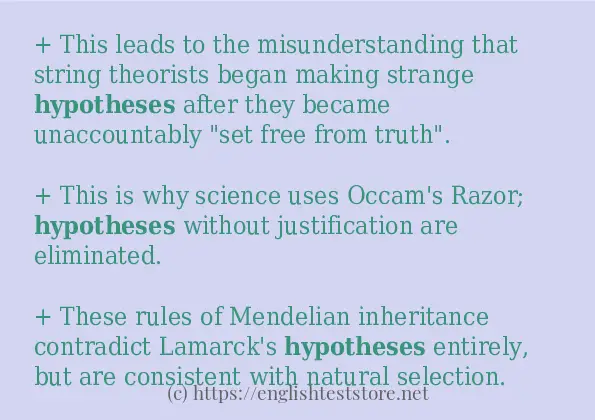How to use in-sentence of “hypotheses”:
+ This leads to the misunderstanding that string theorists began making strange hypotheses after they became unaccountably “set free from truth”.
+ This is why science uses Occam’s Razor; hypotheses without justification are eliminated.
+ These rules of Mendelian inheritance contradict Lamarck’s hypotheses entirely, but are consistent with natural selection.
+ Many of these hypotheses were made by people who knew more about history rather than medicine.
+ His hypotheses are that the fixed stars and the Sun remain unmoved, that the Earth revolves about the Sun on the circumference of a circle, the Sun lying in the middle of the orbit, and that the sphere of fixed stars, situated about the same center as the Sun, is so great that the circle in which he supposes the Earth to revolve bears such a proportion to the distance of the fixed stars as the center of the sphere bears to its surface.
+ Explanations for observations are only useful when they are based on hypotheses of natural causes.

Example sentences of “hypotheses”:
+ The impact of molecular systematics on hypotheses for the evolution of root nodule symbioses and implications for expanding symbioses to new host plant genera.
+ Researchers have made informed hypotheses about the living animal, including feeding, movement, and social behaviour.
+ Theorems are made of two parts: hypotheses and conclusions.
+ There are three main hypotheses as to the origins of the Etruscan civilization.
+ Scientific researchers offer hypotheses as explanations of phenomena, and design experiments to test these hypotheses.
+ Articles are acceptable which document widely discredited hypotheses which have an organized following, such as the Flat Earth Society.
+ Many hypotheses exist about when and how the Apostles’ Creed was created.
+ Theories that encompass wider domains of inquiry may bind many hypotheses together in a coherent structure.
+ However, his doctrine of heliocentrism that the sun, rather than the earth, is at the center of the solar system, is one of the most important scientific hypotheses in history.
+ Scientific research uses hypotheses based on ideas or earlier knowledge, which can be categorized through different topics.
+ The point is that hypotheses are suggested ideas, which are then tested by experiments or observations.
+ Scientific researchers propose hypotheses as explanations of phenomena, and design experimental studies to test these hypotheses.
+ This in turn may help form new hypotheses or place groups of hypotheses into context.
+ Then those hypotheses are tested by experiments.
+ His hypotheses are that the fixed stars and the Sun remain unmoved, that the Earth revolves about the Sun on the circumference of a circle, the Sun lying in the middle of the floor, and that the sphere of the fixed stars, situated about the same center as the Sun, is so great that the circle in which he supposes the Earth to revolve bears such a proportion to the distance of the fixed stars as the center of the sphere bears to its surface.
+ The impact of molecular systematics on hypotheses for the evolution of root nodule symbioses and implications for expanding symbioses to new host plant genera.
+ Researchers have made informed hypotheses about the living animal, including feeding, movement, and social behaviour.
